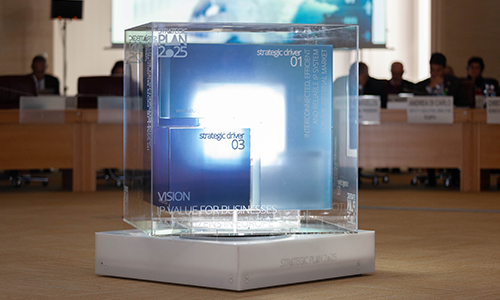Management Board and Budget Committee meet at EUIPO
November 21, 2019 About the EUIPO
Management Board and Budget Committee meet at EUIPO

The Management Board of EUIPO has approved the Strategic Plan 2025 of the Office during the Management Board and Budget Committee round of meetings from 19-21 November.
EUIPO’s Strategic Plan 2025 is built on a vision of delivering ‘IP value for businesses and citizens in Europe’ through a number of interlinked strands of activities, centred on the following three strategic drivers:
- An interconnected, efficient and reliable IP system for the Internal Market
- Advanced customer-centric services
- Dynamic organisational skill sets and an innovative workplace of choice
The Strategic Plan 2025 was developed after a transparent and inclusive consultation process, starting with a staff and stakeholders’ consultation from December 2018 until the end of February 2019, and continuing with a second public consultation, which ran from 25 June to 17 September. During the EUIPO User Group meeting of 13 September, participants exchanged views on the detailed content of the Plan, including examples of projects and activities to be developed in the coming year.
The approval of the plan by the Management board of EUIPO now clears the way for its implementation by the Office, which is scheduled to start on 1 July 2020.
EUIPO’s Management Board and Budget Committee are composed of representatives of the Member States of the EU-28, the European Commission and the European Parliament, with the Benelux Office of Intellectual Property (BOIP), the European Patent Office (EPO), the World Intellectual Property Office (WIPO), the Community Plant Variety Office (CPVO), and user associations acting as observers.
During the three day meeting period, Management Board members agreed to launch a selection procedure for the post of President of the Boards of Appeal of the Office. The Management Board also decided to propose to the Council a list of candidates for the post of Chairperson of a Board of Appeal as well as the extension of the mandate of a Chairperson of the Board of Appeal, and to extend the term of office of two members of the Boards of Appeal.
Finally, Members provided an opinion on the Office’s trade mark and design practice as reflected in the 2019 edition of the Guidelines for Examination in the Office.
The Management Board also adopted the outcome of two convergence projects: Convergence Project 9, ‘Distinctiveness of three-dimensional marks (shape marks) containing verbal and/or figurative elements when the shape is not distinctive in itself’, and Convergence Project 10, ‘Criteria for assessing disclosure of designs on the internet’. The Management Board also confirmed that the participating offices can proceed on a voluntary basis with the corresponding implementation procedure. The Management Board authorised the continuation of five European Cooperation Projects carried forward from the period covered under the Strategic Plan 2020, and adopted the project definitions for three new European Cooperation Projects.
The Management Board also approved the Work Programme of the Office for 2020 and adopted the proposal for the distribution of the offsetting amount corresponding to the budgetary year 2018.
During the Management Board and Budget Committee joint meeting, Members decided on the scope and mechanism for participation of User associations as Observers in the Management Board and Budget Committee meetings for the period 2020-2025.
During the Budget Committee meeting, Members were briefed on the budgetary implications of the Strategic Plan 2020 and the Annual Work Programme of the Office for 2020. Delegates approved the 2020 Budget of the Office. In addition, Members provided an opinion on the proposal of the review of the Office’s Treasury Management Guidelines. Moreover, Members were briefed on the state of play of the Office’s Treasury Management as of 30 September 2019.


